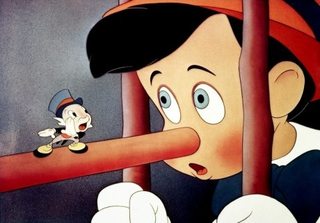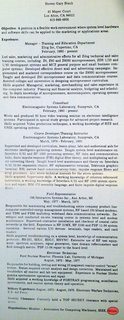Lie in your resume
Reporters' questions about where I studied helped to remember the day when I had to decide whether to lie in my resume.
I got my first job in Silicon Valley thanks to my insight (on my part) and despair (on the part of the first employer). My resume was short: four years in the Air Force, designing emergency protection for a nuclear reactor , a startup in Ann Arbor (Michigan) and, in general, everything.
While working in the second startup (Zilog), life and career took an interesting turn. A recruiter found me (now he works in product marketing) and wanted to introduce me to the leadership of a new interesting organization that produced something called a “workstation”. “This company is engaged in the development of technology, and your biography is wonderful. Why don't you send me a resume, I will give it. ”A few days later the recruiter called me back. “Steve, you did not fill in the education column. Where did you study?"
')
“I didn't finish college,” I replied.
There was silence at the other end of the tube. “Steve, vice president of sales and marketing, used to be the head of the technical department; he is a professor of computer science at Harvard. Prior to that, he worked in the advanced development department of the Xerox Palo Alto Research Center . Most in the sales department are former engineers. I cannot represent a candidate without a college degree diploma. Do something."
I still remember this moment of conversation, in which I realized that I had a choice, but I did not realize how deep, important and significant it was. It was easy to lie, and after some trait the recruiter himself urged to do it. He said that “nobody cares about education anyway.” (This was long before the appearance of the network.)

I said I would think about it. And I really thought for a long time. A few days later I sent him my updated resume, and he handed it to Convergent Technologies. Soon, I and several other people were invited to an interview. I don’t remember all the people I met (my potential manager, various engineers, etc.), but I will never forget the interview with Ben Wedbreit, vice president of sales and marketing.
Ben took my resume and said, “You know, you were invited because I never saw such a resume. You have not contributed a university and there is no education column here. It says “ Mensa ,” he said, pointing to the part where information about education is usually located. “Why?” I glanced at him and said: “I thought Mensah could get your attention.”
Ben stared at me for a long time, and I felt awkward. Suddenly, he asked: "Tell me what you did at previous jobs." It seemed to me that this would be another interview with the story. But after the first phrase “My first startup used a coaxial television cable to implement the local network of control systems processes” (which was quite a modern solution 35 years ago before Ethernet and TCP / IP), please draw out: “Please draw a system diagram on the blackboard. "What? To draw? I spent a half hour of drawing all over, trying to remember the head nodes, the width of the forward and reverse directions, amplifiers, etc. I could barely keep up with the flow of questions from Ben. And there were gaps, the details of which I could not remember. I finished the story and wanted to sit down, but Ben stopped me.
“Since you are at the blackboard, let's talk about your other two past jobs.” I could not believe it, I was already spiritually exhausted, but we talked for another half hour: I drew the diagrams again, and Ben asked questions. At first we talked about ESL (I carefully told the admissible ). Then Zilog microprocessors went, and I drew architecture (it was easy, I taught it) and other system diagrams for an example (already difficult).
Finally, I was able to sit down. Ben looked at me for a long time without saying a word. He got up and opened the door, gesturing for me to go out, shook hands and said: “Thank you for the visit.” What the hell? And it's all? Did I get a job or not?
That evening the recruiter called me. “Ben liked you. In general, he had to convince the vice-president of the marketing department, who did not want to hire you. Congratulations."

Three and a half years later, Convergent Technologies became an open joint-stock company, and I became vice-president of the marketing department and worked under the guidance of Ben. Until the end of my career, Ben was my mentor at Convergent Technologies, my colleague at Ardent, and partner and co-founder at Epiphany. I never again used the trick with Mensa on my resume, and the education clause always remained empty.
But every time I read about the leaders around whom there was a scandal with a fake resume, I remember the moment when I had to choose.
Lesson learned:
I terribly want this place
I got my first job in Silicon Valley thanks to my insight (on my part) and despair (on the part of the first employer). My resume was short: four years in the Air Force, designing emergency protection for a nuclear reactor , a startup in Ann Arbor (Michigan) and, in general, everything.
While working in the second startup (Zilog), life and career took an interesting turn. A recruiter found me (now he works in product marketing) and wanted to introduce me to the leadership of a new interesting organization that produced something called a “workstation”. “This company is engaged in the development of technology, and your biography is wonderful. Why don't you send me a resume, I will give it. ”A few days later the recruiter called me back. “Steve, you did not fill in the education column. Where did you study?"
')
“I didn't finish college,” I replied.
There was silence at the other end of the tube. “Steve, vice president of sales and marketing, used to be the head of the technical department; he is a professor of computer science at Harvard. Prior to that, he worked in the advanced development department of the Xerox Palo Alto Research Center . Most in the sales department are former engineers. I cannot represent a candidate without a college degree diploma. Do something."
I still remember this moment of conversation, in which I realized that I had a choice, but I did not realize how deep, important and significant it was. It was easy to lie, and after some trait the recruiter himself urged to do it. He said that “nobody cares about education anyway.” (This was long before the appearance of the network.)

My updated resume
I said I would think about it. And I really thought for a long time. A few days later I sent him my updated resume, and he handed it to Convergent Technologies. Soon, I and several other people were invited to an interview. I don’t remember all the people I met (my potential manager, various engineers, etc.), but I will never forget the interview with Ben Wedbreit, vice president of sales and marketing.
Ben took my resume and said, “You know, you were invited because I never saw such a resume. You have not contributed a university and there is no education column here. It says “ Mensa ,” he said, pointing to the part where information about education is usually located. “Why?” I glanced at him and said: “I thought Mensah could get your attention.”
Ben stared at me for a long time, and I felt awkward. Suddenly, he asked: "Tell me what you did at previous jobs." It seemed to me that this would be another interview with the story. But after the first phrase “My first startup used a coaxial television cable to implement the local network of control systems processes” (which was quite a modern solution 35 years ago before Ethernet and TCP / IP), please draw out: “Please draw a system diagram on the blackboard. "What? To draw? I spent a half hour of drawing all over, trying to remember the head nodes, the width of the forward and reverse directions, amplifiers, etc. I could barely keep up with the flow of questions from Ben. And there were gaps, the details of which I could not remember. I finished the story and wanted to sit down, but Ben stopped me.
“Since you are at the blackboard, let's talk about your other two past jobs.” I could not believe it, I was already spiritually exhausted, but we talked for another half hour: I drew the diagrams again, and Ben asked questions. At first we talked about ESL (I carefully told the admissible ). Then Zilog microprocessors went, and I drew architecture (it was easy, I taught it) and other system diagrams for an example (already difficult).
Finally, I was able to sit down. Ben looked at me for a long time without saying a word. He got up and opened the door, gesturing for me to go out, shook hands and said: “Thank you for the visit.” What the hell? And it's all? Did I get a job or not?
That evening the recruiter called me. “Ben liked you. In general, he had to convince the vice-president of the marketing department, who did not want to hire you. Congratulations."

Epilogue
Three and a half years later, Convergent Technologies became an open joint-stock company, and I became vice-president of the marketing department and worked under the guidance of Ben. Until the end of my career, Ben was my mentor at Convergent Technologies, my colleague at Ardent, and partner and co-founder at Epiphany. I never again used the trick with Mensa on my resume, and the education clause always remained empty.
But every time I read about the leaders around whom there was a scandal with a fake resume, I remember the moment when I had to choose.
Lesson learned:
- There will be ethical dilemmas throughout your career.
- Choosing the wrong path is often the simplest solution.
- These decisions at the time of their adoption may seem like small and irrelevant methods to cheat.
- Some decisions will have consequences later.
- You will not be tainted by lies, but by the fact of hiding the truth.
- Choose wisely.
Source: https://habr.com/ru/post/285498/
All Articles